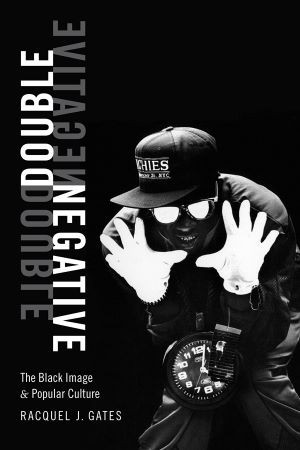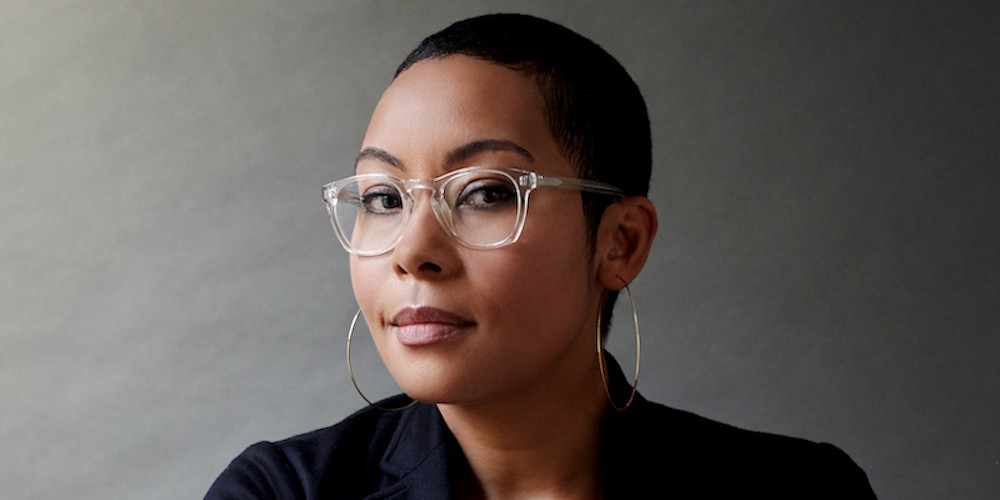This is Who We Are: Racquel Gates
This Is Who We Are is a series featuring Columbia School of the Arts’ professors, covering careers, pedagogy, and art-making during a pandemic. Here, we talk with Associate Professor of Film and Media Studies Racquel Gates about taking pop culture seriously, her academic work on Hollywood and the invention of Blackness.
Racquel Gates joins the School of the Arts as an Associate Professor in Film and Media Studies. “I’m teaching my two favourite courses,” she told me over Zoom. “One is Black Film and Media and the other is Reality Television. Those are my babies. I also love teaching film history and introduction—I love everything I teach for different reasons but those are my research areas of expertise.”
Was this something she always knew she wanted to do?
Gates tells me she was a senior at Georgetown, about to graduate with a BS in Foreign Service, when she realised what really interested her. “It’s interesting,” she said. “I feel there are those people who can tell you from an early age they knew exactly what they wanted to do. They had this very clear path laid out in front of them. That wasn’t me.”
She spent her junior year of college in the northern French city of Strasbourg, on the River Rhine, which served as a seed of inspiration. “What I was particularly struck by during my time there was that 'officially'—according to the government—there was no racism. The party line was, 'We’re all French, there’s no racism—not like you have back in America.’ But clearly racism was there and I wasn’t seeing that discussed on official sites.” Instead, she heard it discussed in French hip-hop. “That’s where people were talking about racial politics in the country; everything that was going on but that they didn’t have a language for.” As a consequence, Gates became interested in the idea of popular culture not just as a site of entertainment—“Although it is that,” she said—but as a forum for serious cultural, political and social critique.
When she returned to Georgetown from France, Gates began taking courses in the humanities. Senior year she took a course called, ‘Representation of Gays and Lesbians in Pop Culture.’ “That was the mind blowing moment for me,” she said, “when I realized that what I was actually interested in, what I had been interested in for a long time, was this serious, rigorous, analysis of culture.”

It brought to mind her own experience growing up in a household that encouraged critical discussion. “For some people their family time was getting around the dinner table. That wasn’t my family. But what we would do is watch movies on Saturday nights and I remember those conversations. My parents aren’t academics, but I think as Black people in this country and Black people who have an understanding of the history of problematic representation—who also have a love of film—we were always talking critically about what we watched.”
Gates was applying for jobs at the NSA and the CIA when she pivoted. An MA in Humanities at the University of Chicago was followed by a Ph.D in Screen Cultures at Northwestern University. In 2018, her first book, Double Negative: The Black Image and Popular Culture, was published by Duke University Press. “The book is trying to take a hard look, a thoughtful look, at these moments in Black popular culture that are typically seen as 'negative,' as doing problematic work in terms of Black representation. What I argue is that it’s actually in these places of negativity that you find some of the most interesting, subversive, and potentially radical politics in terms of thinking through issues of race and gender and representation.”
Gates' next project is titled Hollywood Style and the Invention of Blackness. It’s a look at classic Hollywood style aesthetics: cinematography, editing, lighting, and thinking about the ways that aesthetics from that period have come to define how Blackness is represented on screen. Gates said, “From a theoretical perspective part of what really excites me about the new book is this opportunity to sit and reflect and rethink and reframe films and objects that we think we know. There’s this assumption, particularly when we’re talking about older films and Black characters, that anything that happened before 1990 was just awful and racist—a lot of it was obviously—but there were also really fascinating, subversive, cheeky, inventive things that performers were doing working within the limitations of this really oppressive structure.”
Recently, Gates noticed a clip of the Nicholas Brothers’ famous dance number from the 1943 film Stormy Weather circulating social media. She said, “What’s interesting is that somebody colorized this sequence—it was originally in black and white—and the clip started circulating social media with this title that said something like, ‘Look at this dance number, it was totally unrehearsed and unedited,’ which was just factually inaccurate. The idea that professionals like the Nicholas Brothers would ever allow themselves to be recorded on film having not rehearsed is ridiculous. Maybe they didn’t rehearse that exact day but it’s not an unrehearsed dance sequence. It’s also clearly edited because you can see the cuts in the film. What I was really interested in was thinking about what that kind of language does; in a contemporary moment, I think a lot of people think the solution to stereotypes, the solution to the misrepresentation of people on film, has been authenticity. So the language around this new circulated clip is all about authenticity—nothing’s rehearsed, nothing’s edited—but what drops out then is the emphasis on professionalism. The fact these two performers are just ‘naturally’ talented is problematic, right? As opposed to saying, ‘They worked quite hard at it.’ What I find fascinating, and what I’ve started working through a little bit, is putting these ideas in conversation. What do we lose when we attempt to valorise the Nicholas Brothers’ immense talent in this way? What happens when we think ‘constructedness’ is a bad thing?”
Questioning the way screen cultures are packaged and disseminated is one of Gates' critical concerns as a scholar. Outside of the academy, she continues this work in the popular press. Gates has written articles for The New York Times (“Why I Love Reality Television;” "The Problem with ‘Anti-Racist Movie Lists'") and The LA Review of Books (“What Snooki and Joseline Taught Me About Race, Motherhood, and Reality TV”). Last year she collaborated with the Criterion Collection on a boxset release of Melvin Van Peebles films. “For me this work feels like an extension of what I do speaking with students in the classroom. My approach is the same: to get people excited about the thing they are about to watch and pair that with the kind of analysis that only a scholar can provide; but never in a way that is inaccessible. Melvin Van Peebles is one of those directors people who are into film think they know; but he was also somebody who was super aware of his own image, and, in my opinion, did things and said things which were as much for his public facing image as his artistry. And so in my role as Consulting Producer—whether it was selecting the scholars to be part of the scholars panel or thinking about who would write the essays, the interviews, the supplemental features and other media texts that are part of the boxset—was this opportunity to paint a much fuller, multifaceted portrayal of Van Peebles as a person as well as an artist. I wanted people who had never heard of him to feel as though they were being invited in, and people who were familiar with his work to feel like they had learned something new.” The Melvin Van Peebles: Essential Films boxset is available through The Criterion Collection now.
Before we finished, I asked Gates how New York City functions as a resource for teaching film. She said, “I can’t imagine a better place to do what I do than New York City. You think about the promise of New York in Spike Lee’s films, in Scorsese’s films, in Woody Allen’s films. There’s something really special about being able to teach those films—films which are so important in cinematic history—when they’re so local. I mean, it’s great to be able to point out sites to students that they can go and visit. I remember when Boardwalk Empire was filming in my neighborhood and you would see extras in period costumes just on the street. The things we have access to here, which just isn't the case in other parts of the country, is an immense privilege and I feel immensely privileged to be able to do this work in this city.”
Dr. Racquel Gates received her Ph.D from Northwestern University’s department of Screen Cultures. She also holds an MA in Humanities from the University of Chicago and a BS in Foreign Service from Georgetown University. Her research focuses on Blackness and popular culture, with special attention to discourses of taste and quality. She is the author of Double Negative: The Black Image and Popular Culture (Duke, 2018), where she argues that some of the most disreputable representations in Black popular culture can strategically pose questions about Blackness, Black culture, and American society. In 2020, she was named an Academy Film Scholar by the Academy of Motion Picture Arts and Sciences. She used the grant to support work on her next book, Hollywood Style and the Invention of Blackness. Committed to bringing together film studies in an academic context and film appreciation in more popular settings, Gates maintains a robust public engagement. Her work appears in both scholarly and popular publications, some of which include The New York Times, The Los Angeles Review of Books, Film Quarterly, Television & New Media, as well as other journals and collections. She is also a regular contributor to numerous podcasts, television programs, and recorded film interviews.
